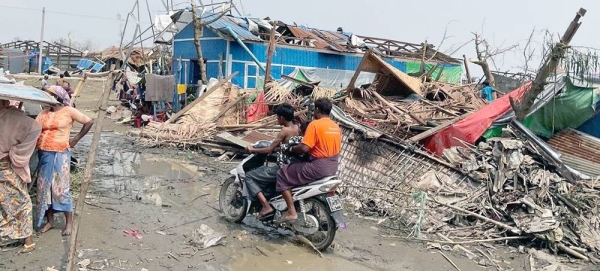
Dozens are feared dead and others still trapped underground after an abandoned goldmine collapsed in Zimbabwe.
Six men have so far emerged alive from the mine at Bindura, about 70km north of the capital Harare after the disaster on Wednesday. According to officials, nearly 30 miners remain unaccounted for.
Rescue efforts failed to start until Friday, after the generator used to drain the 100-metre long mine shaft jammed and another had to be found, authorities say.
“On Thursday the rescue team tried to pump out the water but the generator failed. They started again today. The hardest thing is that the shaft is 100 metres deep,” Christine Munyoro of the Zimbabwe Miners Federation (ZMF) told the Guardian. “We also do not know what level there are at. They may be trapped in the mud.’”
The government confirmed the incident, saying support pillars had apparently been damaged by blasting.
“A tragedy has occurred at Ran mine in Bindura town,” said Ministry of Information secretary Nick Mangwana. “A deep disused mine trench has caved in trapping several illegal goldminers. Exact number not yet established. So far six miners have been rescued. Details to follow but numbers could be circa 30.”
The mine collapse comes weeks after six miners died in Esigodini, southern Zimbabwe, while five others died in Chegutu when mines collapsed.
Last year 24 miners died at Battlefields, Kadoma, 125km from Harare, when the shaft they were working was flooded following heavy rains.
Rescuers took five days to clear water from the mine shafts. Only one doctor was on site during the rescue operation.
The government has been criticised for failing to regulate mining activities in the country, and allowing companies to leave disused mines unguarded.
ZMF, a grouping of small-scale miners, says illegal mining has become a dangerous practice in the country. “We have lobbied the minister of mines to expedite formalisation and regularisation of the artisanal mining sector. Once these illegal miners have title, they will mine sustainably,” its president, Wellington Takavarasha, told the Guardian.
“You never know how many are in the shaft, they use secret tunnels which is highly dangerous,” Takavarasha said.
Mining is a leading source of foreign currency for Zimbabwe, where gold accounts for 60% of exports.
The gold sector provides work for nearly 10% of the country’s population, according to the International Crisis Group (ICG).
But the risky practice of illegal mining has been on the rise in the gold-rich country due to high levels of joblessness, exacerbated by a Covid-19 lockdown that has triggered a rush to the goldmines as families struggle under tough economic conditions.
Accidents caused by explosions and flooding are common in illegal mining, which is often carried out under dangerous conditions and with little regard for safety standards.












